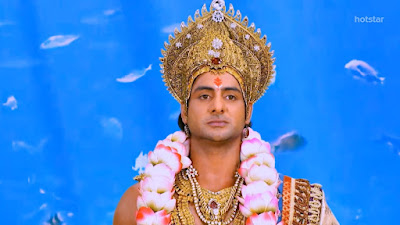SRIMAD MAHABHARATA - SABHA PARVA - SABHAKRIYA (UPA) PARVA - CHAPTER 4 - YUDHISHTHIRA ENTERS THE SABHA
“Vaishampaayana said, “Then
that chief of men, king Yudhishthira, entered that sabha having first fed ten
thousand Brahmanas with preparations of milk and rice (the mix of milk and rice is called
as Paayasam in Sanskrit) mixed with
clarified butter and honey with fruits and roots, and with pork and meat of
deer. The king satisfied those superior Brahmanas, who had come from various
countries with food seasoned with sesamum and prepared with vegetables called
jibanti, with rice mixed with clarified butter, with different preparations of
meat – with indeed various kinds of other food, as also numberless items of
food that are fit to be sucked and innumerable kinds of drinks, with new and
unused robes and clothes, and with excellent floral arrangements. The king also
gave to each of those Brahmanas a thousand cows.
“O Bharata (Janamejaya), the voice of the gratified Brahmanas uttering, ‘What an auspicious
day is this!’ became so loud that it seemed to reach heaven itself. When the
Kuru king (Yudhishthira) entered the
sabha having also worshipped the Devas with various kinds of music and numerous
species of excellent and costly perfumes, the athletes, mimes, prize-fighters,
poets and praisers began to satisfied that illustrious son of Dharma (Yudhishthira) by exhibiting their skill. Thus
celebrating his entry into the sabha, Yudhishthira with his brothers sported
within that sabha like Shakra Himself in heaven. Upon the seats in that sabha
sat, along with the Paandavaas, Rishis and kings that came from various
countries, viz., Asita and Devala, Satya, Sarpamaali, and Mahaashira; Arvaavasu,
Sumitra, Maitreya, Shunaka, and Bali; Baka, Daalbhya, Sthoolashira,
Krishna-Dwaipaayana (Maharishi Vyaasa),
and Shuka; Sumanta, Jaimini, Pailaa, and the disciples of Vyasa, viz., ourselves;
Tittiri, Yaagnyavalkya, and Lomaharshana with his son; Apsuhomya, Dhaumya, Aanimandavya,
and Kaushika; Daamoshneesha and Traivani, Parnaadaa, and Ghatajaanuka; Maunjaayana,
Vaayubhaksha, Paaraasharya, and Saarika; Balavaaka, Shineevaka, Sutyapaala, and
Krita-srama; Jaatukarna, Shikhavaa, Subala and Paarijaataka; the noble Parvata,
the great Muni Maarkandeya; Pavitrapaani, Saavarna, Bhaluki, and Galava. Janghaabandhu,
Raibhya, Kopavega, and Bhrigu: Haribabhru, Kaundinya, Babhrumaali, and
Sanatana; Kakshivaana, Ashija, Naachiketa, and Gautama; Paingaa, Varaaha, Shunaka,
and Shaandilya of great Tapas merit: Karkaraa, Venujangha, Kalaapa and Katha – these
Dharmic and learned Munis with senses and souls under complete control, and
many others as numerous, all well-skilled in the Vedas and Vedaangaas and familiar
with (rules of) Dharma and pure and
spotless in behaviour, waited on the illustrious Yudhishthira, and gladdened
him by their sacred discourses.
“So also numerous
principal Kshatriyas, such as the illustrious and Dharmaraja Munjaketu, and Vivardhana;
Sangraamajit, Durmukha, and the powerful Ugrasena; Kakshasena – the lord of the
Earth, and the invincible Kshemaka; Kamala – the king of Kaamboja, and the
mighty Kampana who alone made the Yavanaas to ever tremble at his name just as
the Deva that wields the Vajra (Lord Indra) makes
those Asuras, the Kaalakeyaas, tremble before Him; Jataasura, and the king of
the Madrakaas, Kunti, Kulinda, the king of the Kiraataas; the kings of Anga and
Vanga, Pundrakena, the king of Paandya and the king of Udhara, and Andhaka;
Sumitra, and Saibya that slayer of foes; Sumanaa – the king of the Kiraataas;
Chanura, the King of the Yavanaas, Devaraata, Bhoja, and Bhimaratha; Srutaayudha
– the king of Kalinga, Jayatsena – the king of Magadha; Susharma, Chekitaana,
and Surathaa – that slayer of enemies; Ketumaan, Vasudaana, Vaidehaa and
Kritakshana; Sudharmaa, Aniruddhaa, Srutaayu filled with great strength; the
invincible Anooparaja, Durdarsha, Kshemaji, Sudakshina; Sishupaala with his
son, the king of Karushaa; the invincible youths of the Vrishni race, all equal
in beauty to Devas, viz., Aahuka, Viprithu, Gada, Saarana, Akrura, Kritavarmaa,
and Saatyaki, the son of Shini; Bhismaka, Aahruti, and the powerful Dyumatsena,
those chief of bowmen viz., the Kaekayaa and Yagnasena of the Somaka race (King
Drupada); these Kshatriyas filled with
great might, all well-armed and wealthy, and many others also regarded as the
foremost, all waited upon Yudhishthira – the son of Kunti, in that Sabha,
desirous of ministering to his happiness. Those princes also, filled with great
strength, who dressing themselves in deer-skins learnt the science of weapons (Dhanurveda
in Sanskrit) under Arjuna, waited upon
Yudhishthira.
“O
king (Janamejaya), the princes also of the Vrishni race,
viz., Pradyumna (the son of Rukmini)
and Saamba, Yuyudhaana – the son of Saatyaki, Sudharma, Aniruddha and Saibya
that foremost of men who had learnt the science of arms (Dhanurveda) under Arjuna these and many other kings, O
lord of the Earth (Janamejaya), used
to wait on Yudhishthira on that occasion. That friend of Dhananjaya, Tumburu,
the Gandharva Chitrasena with his ministers, any many other Gandharvas and
Apsaras, well-skilled in vocal and instrumental music and in rhythm and Kinnaraas
also well-versed in (musical)
measures and motions singing divine tunes in proper and charming voices, waited
upon and gladdened the Paandavaas and the Rishis who sat in that Sabha. Seated
in that Sabha, those bull among men, of rigid vows (Vrata in Sanskrit) and devoted to truth, all waited upon
Yudhishthira like Devas in heaven waiting upon (Lord) Brahma.”

No comments:
Post a Comment